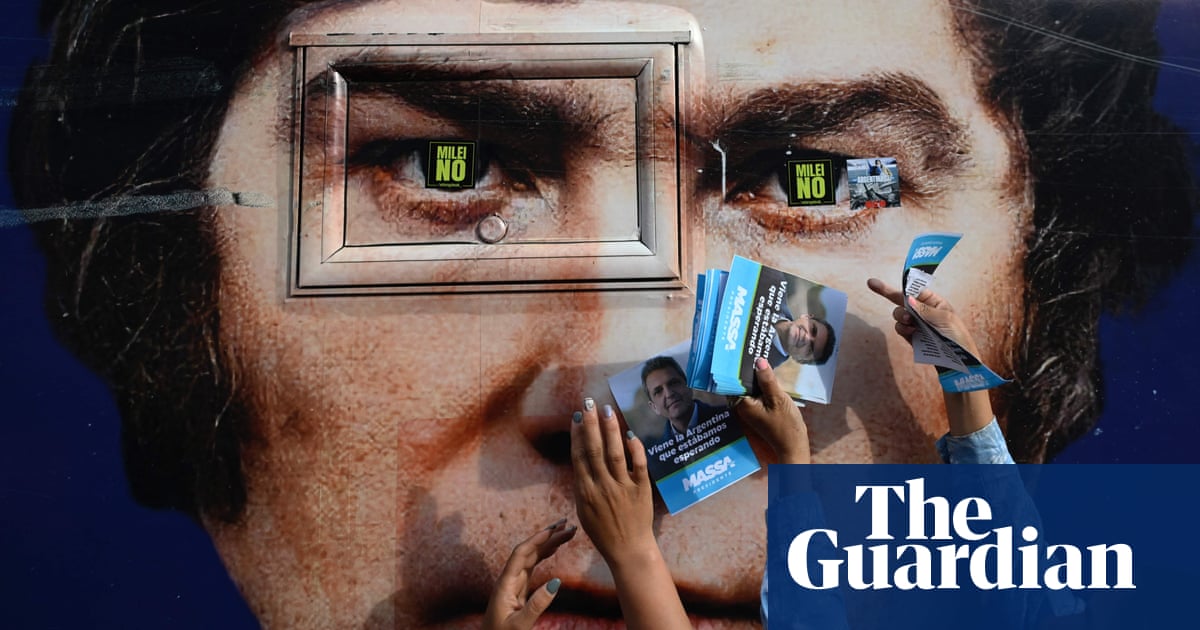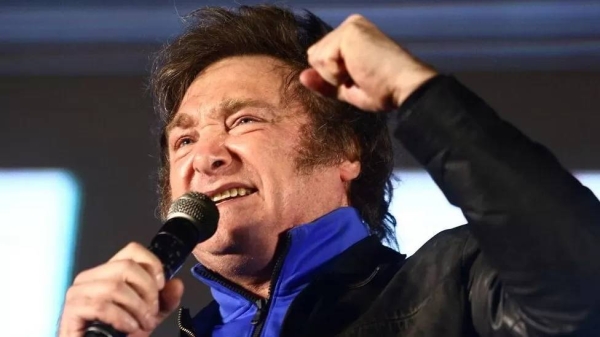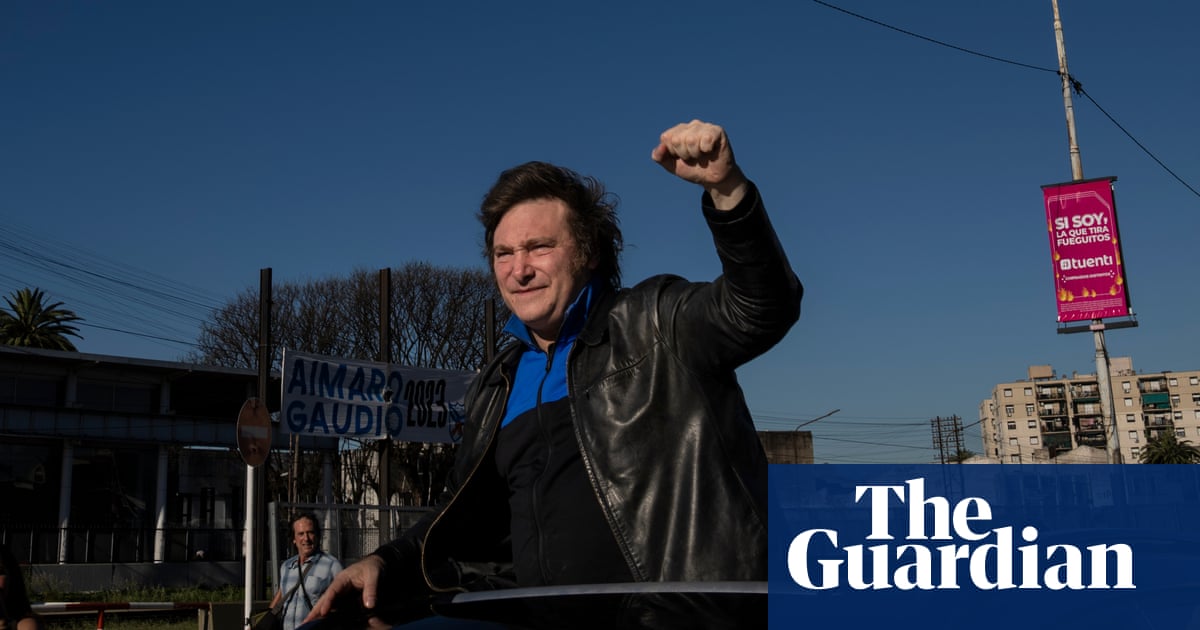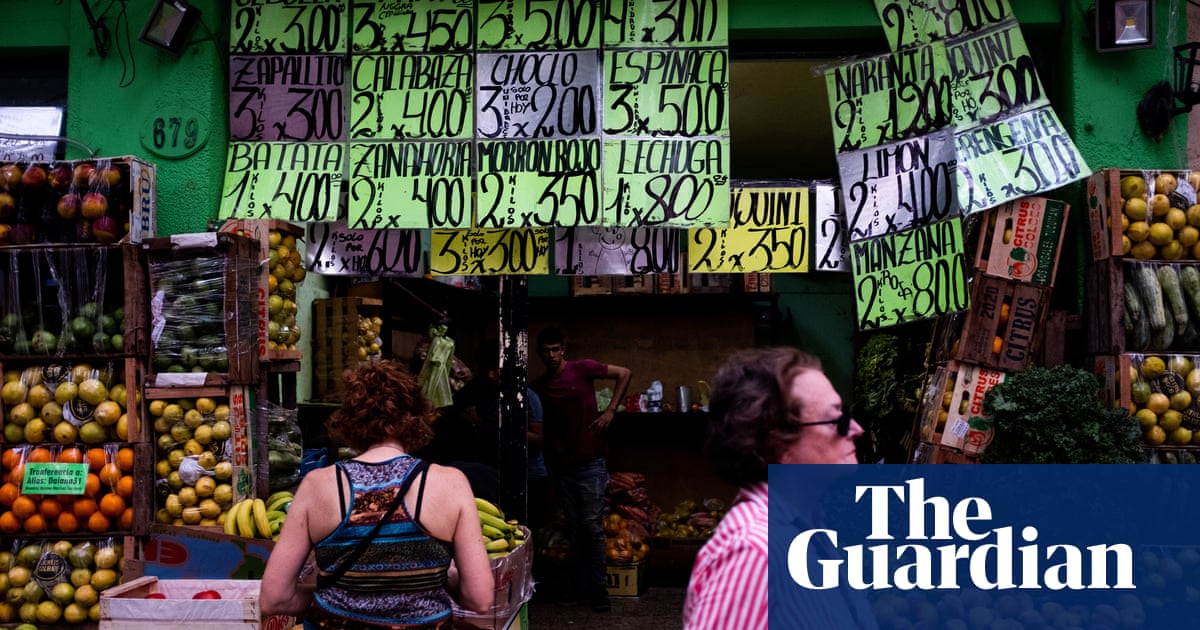
Argentina is teetering on the brink of an unpredictable new political era this weekend with an erratic far-right populist known as “El Loco” (the Madman) the slight favourite to become president of South America’s second-largest economy in Sunday’s election.
As polls opened on Sunday morning against a backdrop of soaring inflation and widespread poverty, analysts believed Javier Milei, a TV celebrity turned congressman, held a slender advantage over his rival, the finance minister, Sergio Massa, but said the result was too close to call.
Massa, a centrist member of Alberto Fernández’s incumbent Peronist administration, unexpectedly won last month’s first round, with 9.8m votes to Milei’s 8m. But since then Milei – a climate-denying provocateur often compared to the far-right populists Donald Trump and Jair Bolsonaro – has been endorsed by several influential conservatives, including former president Mauricio Macri and the third-place candidate, Patricia Bullrich, who had previously condemned Milei’s “bad and dangerous” proposals.
Milei has dialled down his inflammatory rhetoric in the weeks since October’s vote, hoping to seduce voters put off by his radical ideas, which include closing more than a dozen ministries, cutting ties with Argentina’s two biggest trade partners, Brazil and China, and condemning the pope as “a lefty son of a bitch”.
“This is the most important election in the last 100 years,” Milei declared this week, urging voters to evict the “delinquent” Peronist politicians who have governed Argentina for 16 of the last 20 years “and have ruined our lives”.
He said: “Let hope overcome fear. The hope of a better country exists.”
Massa has spent recent weeks battling to focus voters’ minds on Milei’s volatile character, rather than the economic failures of his government, under which four in 10 Argentinians found themselves in poverty and inflation soared to more than 140%.
“Milei’s personality gives Massa a path to the presidency,” said Juan Cruz Díaz, the managing director of Buenos Aires consulting firm Cefeidas Group.
However, experts say concerns over Milei’s mindset may be insufficient to save Massa’s campaign, given Argentina’s economic woes. “This is a failed government with a record level of inflation and he is the minister for the economy,” said Federico Finchelstein, an Argentinian historian who studies the new wave of rightwing populists leaders, including Trump, Bolsonaro and Milei. “So [people think]: ‘Between a terrible thing and a crazy guy, let’s go for crazy, because perhaps it’s better than a terrible thing.’”
Finchelstein, who works at New York’s New School for Social Research, doubted most voters were enamored of Milei’s far-right ideas or foul-mouthed style. “But you have two really bad candidates and the question in Argentina is: ‘Which is the lesser evil?’”
One Brazilian newspaper said many of the undecided voters who will decide the election saw their choice as being between Dracula and Frankenstein, with Mary Shelley’s mad scientist representing Milei.
Observers are divided on what a Milei presidency might look like. The wild-haired celebrity economist – who only entered politics after being elected to congress in 2021 – has vowed to abolish Argentina’s central bank, replace its currency with the dollar, and slash government expenditure by 14%. On the campaign trail he has brandished a chainsaw to symbolize his desire to eliminate spending and corruption. His vice-presidential running mate, Victoria Villarruel, has ties to members of Argentina’s murderous 1976-83 dictatorship and has controversially questioned the consensus over the number of people killed by that regime.
But Díaz doubted the hard-right libertarian – whose party, La Libertad Avanza (Freedom Advances), controls just 38 of 257 seats in the lower house and eight of 72 in the senate – would have the political “firepower” to push through his most radical plans if elected.
“Milei doesn’t have a single governor, Milei doesn’t have a single mayor, and his presence in congress is extremely limited. He will face fierce resistance from social movements. So I’m not sure how likely major reforms are in the first two years,” Díaz said, speculating that traditional politicians such as Macri might play a major role in his administration, forcing him to moderate.
Ariel Goldstein, an Argentinian sociologist who has written books on Bolsonaro and Latin America’s authoritarian revival, said a Milei victory would boost fellow rightwing populists around the world. “Buenos Aires could become a new mecca for the global far right,” said Goldstein, predicting a Milei victory would also spark profound “social conflict” as protesters resisted his cuts.
That view was echoed on the eve of the election by more than 100 leading economists who warned a Milei presidency could cause economic “devastation” and social chaos.
Finchelstein said one of his greatest fears was Milei himself. “He is way more excessive and unstable than Bolsonaro and Trump. So it’s highly unpredictable what this person could do [in power],” he said.
“We are talking about a person who is prone to sudden changes of mood, who is highly unstable and that, according to some journalistic research, even has a dead dog as a political adviser. This sounds like a bad joke – but it’s not,” Finchelstein added.
Latin American leftist leaders have also voiced alarm in recent days, with Colombia’s President Gustavo Petro claiming Argentinian voters had a choice between “hope and barbarism” and Brazil’s Luiz Inácio Lula da Silva urging Argentina to elect a president “who likes democracy and respects institutions”.
Conservative figures, including the former Mexican presidents Felipe Calderón and Vicente Fox, Colombia’s Iván Duque, Chile’s Sebastián Piñera and the Peruvian author Mario Vargas Llosa backed Milei’s campaign as a way of “democratically eradicating” the “perverse economic policies” of Massa’s political movement. Vargas Llosa has a poor track record when it comes to supporting presidential hopefuls having previously championed defeated rightwing candidates including Brazil’s Bolsonaro, Chile’s José Antonio Kast and Peru’s Keiko Fujimori.
Milei’s allies reject his portrayal as an unbalanced powder keg, although they do not refute claims their leader takes counsel from his cloned mastiffs.
“They will say anything about us. They say we are Nazis … We laugh at it. Think whatever you want,” his close ally Lilia Lemoine said in a recent interview, dismissing the idea Milei was an extremist.
Lemoine, a cosplayer-turned-congresswoman-elect, said Milei had earned the nickname “El Loco” “because he was very passionate”. “That’s not bad. I mean, you have to be a little bit crazy to take the risk to go against all this corruption,” she said.












